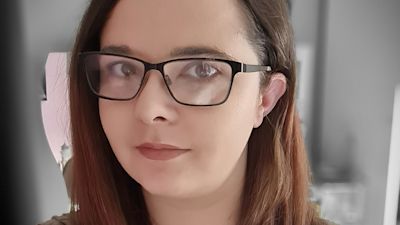Gateshead woman with life-long health problems calls for more information around drugs in pregnancy

A woman from Gateshead has been left with a raft of life-long health problems caused by medication taken during her mother's pregnancy.
Bethany Dodgson, 28, has foetal valproate syndrome and suffers from epilepsy, chronic fatigue syndrome, an underactive thyroid and dyslexia.
She and her brother Dominic were both affected by a drug their mother took to control her epileptic seizures, commonly known as Sodium Valproate.
Now a carer for her brother and mother, Ms Dodgson wants women to be given the "full" information around the use of medication in pregnancy.
She said her mother was not told of the potential risks of the medication and has been left "angry".
"She also feels guilty as she didn't know what would have happened in the future with me and my brother," she added.
"She's thinking if she did know, would it have been a different story?"
Earlier this year, an investigation by the Sunday Times found some mothers were still not being given the full information on Sodium Valproate, and six babies a month were being born after exposure to it.
The number of people affected by what is now known as foetal valproate spectrum disorder (F.V.S.D) is 20,000.
Former Health Secretary Jeremy Hunt has previously said he would like to see the drug banned for all pregnant women.
Guidelines state women who might bear children and who are taking the medication should be on a pregnancy prevention programme.
They also state that the full information on the drug should be clearly marked on the packet, and given in an accompanying information leaflet.
What is Sodium Valproate?
Sodium valproate is drug used to treat epilepsy and was licensed in 1972.
It has various brand names. There is more information on it on the NHS website.
Reports of children being born with a number of health problems and deformities were recorded in the 1980s, which is when the term 'Fetal Valproate Syndrome' was first used.
In 2020, after decades of parents and families raising concerns, the Cumberlege report concluded that thousands of mothers and babies had been exposed to "avoidable harm".
'Horrifying' suffering of women in NHS was avoidable, review finds
Ms Dodgson's mother was one of those, and her children now live with the life-long effects of the medication she took to control her epilepsy while pregnant.
What happened next?
Since the review there have been changes.
The Medicines and Healthcare products Regulatory Agency - or MHRA - acknowledge that using Valproate in pregnancy carries "significant risks of harm" to the baby and should not be taken by any woman who could bear children, unless they are on what is known as a 'pregnancy prevention programme' which includes using contraception.
In a statement they said: "We have also worked with the Department of Health and Social Care to seek views from the UK public on requirements to ensure medicines that contain sodium valproate are always dispensed in the original manufacturer's packaging so that the important safety information on risks in pregnancy is provided with every dispensed prescription.
"Our safety work on sodium valproate is ongoing and we will continue to review, adapt and implement regulatory measures where appropriate that will enable the continued safe use of this medicine in individuals who can get pregnant where there are no other viable options available. "
Campaigners want to see further changes and compensation to support families still suffering.
Janet Williams and Emma Murphy founded INFACT, a group founded in 2012 by two mums who have children affected by exposure to Sodium Valproate. They offer support to parents and others who are affected.
They do not want to see the drug banned, but they want to see women given the full information about its risks.
What do the drugs companies say?
ITV News Tyne Tees contacted the drugs companies who manufacture products using Sodium Valproate.
Sanofi said they had informed the UK Government "at all times" since the drug was licensed in the 1970s that there was a potential risk of birth defects (teratogenicity) and relevant warnings were included in data sheets - and that reducing the risks associated with the use of the medicines was a "priority". They expressed sympathy for cases like those of Ms Dodgson and her family and said valproate was "an important treatment that many men and women in the UK continue to rely on to control seizures during their lifetime". They added that "the health risks from poor control of seizures should not be underestimated".
Desitin said: "We support and adhere to the Medicines and Healthcare products Regulatory Agency (MHRA) Guidance on Valproate use in women and girls."
Aspire Pharma say their generic product which uses Sodium Valproate was approved for sale in the UK by 2020. They say they 'facilitate the provision of educational materials to patients and physicians regarding the risks of taking these products in pregnancy'.
Important advice from the NHS:
There is more information about the drug on the NHS website but they say you should get advice as soon as possible if you think you are pregnant or might become pregnant while taking Sodium Valproate, but it is really important you do not stop taking your medicine suddenly without talking to your doctor first.
Listen to our latest podcasts to find out What You Need To know...